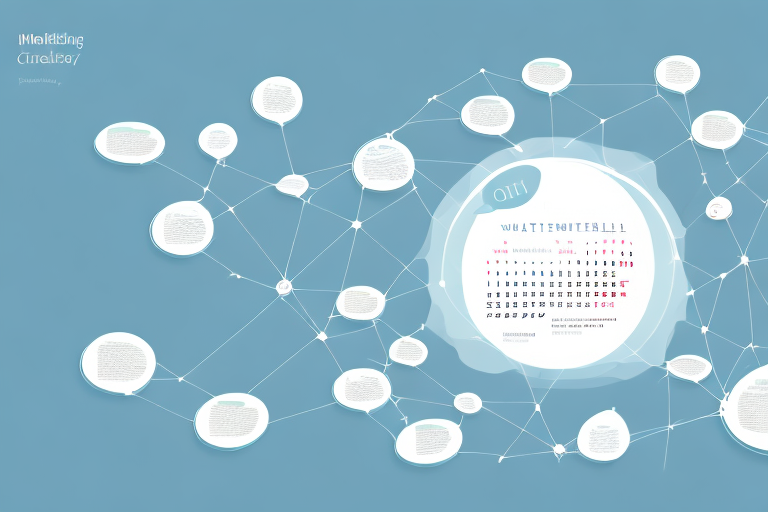In today's fast-paced business environment, effective collaboration is essential for successful marketing campaigns. Marketing collaboration tools have emerged as the go-to solution for organizations seeking to streamline their processes, enhance team communication, and boost overall productivity. By leveraging these tools, businesses can ensure consistency in their marketing efforts and facilitate real-time collaboration among team members. In this article, we will delve into the various benefits of using a marketing collaboration tool and explore its role in modern business practices.
Understanding Marketing Collaboration Tools
Before diving into the benefits, let's first understand what marketing collaboration tools are and how they function. Marketing collaboration tools are software platforms designed to facilitate seamless collaboration among marketing teams. These tools provide a centralized space where team members can work together, share ideas, and coordinate their efforts effectively. They offer a wide range of features, such as task management, file sharing, project tracking, and communication tools, which enable teams to work efficiently.
Marketing collaboration tools have revolutionized the way marketing teams operate. In the past, teams would rely on scattered email threads and endless meetings to stay connected. However, with the advent of collaboration tools, marketers now have a unified platform that brings together all the necessary tools and resources in one place.
Definition and Function of Marketing Collaboration Tools
Marketing collaboration tools can be defined as digital solutions that enable marketing teams to collaborate, plan, and execute their campaigns in a centralized environment. These tools help in creating a cohesive and coordinated approach to marketing by bringing together various stakeholders, such as designers, copywriters, social media managers, and project managers, onto a single platform. By providing a centralized space for team members to collaborate, these tools eliminate the need for constant back-and-forth communication via emails and meetings, saving time and improving efficiency.
Imagine a scenario where a marketing team is working on a new product launch. In the past, each team member would have to send multiple emails, schedule meetings, and track progress separately. With marketing collaboration tools, this process becomes streamlined. Team members can create tasks, assign them to specific individuals, and track their progress in real-time. This level of transparency and accountability ensures that everyone is on the same page, leading to a more efficient and successful campaign.
Key Features of Marketing Collaboration Tools
Marketing collaboration tools come with a variety of features designed to streamline marketing processes. These include:
- Task management: Tools that allow teams to assign and track tasks, ensuring everyone is on the same page. With task management features, marketers can easily prioritize their work, set deadlines, and monitor progress.
- File sharing: Platforms that enable seamless sharing and collaboration on marketing assets, such as images, videos, and documents. These tools provide a centralized repository for all marketing materials, making it easy for team members to access and collaborate on files.
- Project tracking: Tools that provide real-time updates on project progress, deadlines, and milestones. With project tracking features, marketing teams can stay organized and ensure that projects are completed on time.
- Communication tools: Platforms equipped with chat or messaging functionalities to foster communication and collaboration among team members. These tools eliminate the need for lengthy email threads and provide a quick and efficient way for team members to communicate and share ideas.
By incorporating these features, marketing collaboration tools empower teams to streamline their workflows, improve communication, and enhance overall productivity. With the ability to assign tasks, share files, track projects, and communicate seamlessly, marketing teams can focus more on strategic initiatives and less on administrative tasks.
The Role of Marketing Collaboration Tools in Business
Marketing collaboration tools play a crucial role in driving success within businesses by enhancing team communication and streamlining marketing processes. Let's explore their role in more detail.
Enhancing Team Communication
Effective communication is the cornerstone of any successful marketing campaign. By using collaboration tools, teams can communicate in real-time, ensuring that everyone is up to date with the latest developments. This level of communication fosters a sense of unity and collaboration among team members, leading to increased productivity and better outcomes.
With marketing collaboration tools, team members can easily share ideas, provide feedback, and ask questions. The ability to have open discussions and brainstorming sessions within the tool allows for the exchange of diverse perspectives and insights. This collaborative environment encourages creativity and innovation, leading to the development of more effective marketing strategies.
Furthermore, these tools provide a platform where team members can engage in continuous, seamless communication. Whether it's discussing campaign strategies, sharing feedback on designs, or addressing any challenges that arise, the real-time nature of collaboration tools ensures that no time is wasted waiting for responses or scheduling meetings. This efficient communication process enables teams to make quick decisions and adapt to changing market dynamics promptly.
Streamlining Marketing Processes
Marketing collaboration tools streamline the entire marketing process, eliminating inefficiencies and reducing bottlenecks. These tools provide a centralized platform where teams can plan, execute, and monitor their marketing activities.
By centralizing project management, marketing collaboration tools enable teams to stay organized and have a clear overview of all ongoing projects. This visibility into tasks, deadlines, and responsibilities ensures that nothing falls through the cracks and allows for effective resource allocation.
Moreover, these tools facilitate task delegation and tracking. Team members can easily assign responsibilities, set deadlines, and track progress within the collaboration tool. This level of transparency and accountability ensures that everyone is aware of their roles and responsibilities, reducing the chances of miscommunication and missed deadlines.
Additionally, marketing collaboration tools often come with features such as file sharing and version control. This allows team members to collaborate on documents, designs, and other assets in a centralized and organized manner. With a single source of truth, teams can avoid confusion and prevent the loss of important information.
Furthermore, these tools often integrate with other marketing software and platforms, such as customer relationship management (CRM) systems and analytics tools. This integration streamlines data flow and enables teams to access relevant information and insights within the collaboration tool itself. By having all the necessary data at their fingertips, teams can make data-driven decisions and optimize their marketing efforts.
In conclusion, marketing collaboration tools are essential for enhancing team communication and streamlining marketing processes. By fostering collaboration, enabling real-time communication, and providing centralized project management, these tools empower teams to work more efficiently and effectively. Investing in marketing collaboration tools can significantly contribute to the success of businesses in today's competitive market.
Advantages of Using Marketing Collaboration Tools
Using marketing collaboration tools comes with several advantages that can significantly benefit businesses. Let's take a closer look at some of these advantages.
Boosting Productivity and Efficiency
Collaboration tools enhance productivity by providing teams with a structured environment to work in. By streamlining communication and project management, these tools reduce the time spent on administrative tasks, enabling team members to focus on the creative aspects of their work. With fewer distractions and a clear overview of tasks and deadlines, teams can maximize their efficiency and output.
Facilitating Real-Time Collaboration
Real-time collaboration is crucial in today's fast-paced business world. Marketing collaboration tools offer a platform where team members can work together simultaneously, providing instant feedback, making revisions in real-time, and ensuring that everyone is on the same page. This level of collaboration fosters creativity, speeds up decision-making processes, and ultimately leads to more effective marketing campaigns.
Ensuring Consistency in Marketing Efforts
Consistency is key when it comes to marketing efforts. Marketing collaboration tools enable teams to maintain consistency throughout their campaigns by providing a centralized space to store and access brand guidelines, templates, and other marketing assets. This ensures that all team members are aligned with the brand's voice, style, and messaging, resulting in cohesive and impactful marketing materials.
Choosing the Right Marketing Collaboration Tool
Now that we understand the benefits of using marketing collaboration tools, it's important to choose the right one for your business. Let's explore some factors to consider and popular tools available in the market.
Factors to Consider
When selecting a marketing collaboration tool, consider factors such as:
- Scalability: Ensure that the tool can accommodate your growing team and future business needs.
- Integrations: Check if the tool integrates with other software and platforms you use, such as project management or customer relationship management (CRM) tools.
- User-friendliness: Opt for a tool that is intuitive and easy for your team to adopt, minimizing the learning curve.
By assessing these factors, you can find a tool that aligns with your business requirements and effectively serves your marketing collaboration needs.
Popular Marketing Collaboration Tools in the Market
Several marketing collaboration tools have gained popularity in the market due to their powerful features and user-friendly interfaces. Some popular choices include:
- Trello: Known for its simplicity and ease of use, Trello offers a visual project management system that allows teams to organize tasks using boards, lists, and cards.
- Asana: Asana is a comprehensive project management tool that helps teams track and manage projects, assign tasks, and collaborate in real-time with features like checklists, due dates, and commenting functionalities.
- Slack: Primarily a communication tool, Slack enables teams to collaborate through channels and direct messages, share files, and integrate with other marketing tools, such as Google Drive and Dropbox.
These tools have earned acclaim for their versatility, functionality, and user-friendly interfaces, making them popular choices among marketing teams.
Implementing a Marketing Collaboration Tool
Now that you've chosen the right marketing collaboration tool, it's time to implement it successfully within your organization. Here are some steps to follow:
Steps for Successful Implementation
1. Clearly define your objectives: Determine what you want to achieve by using the collaboration tool. Set clear goals and communicate them to your team.
2. Provide training and support: Ensure that your team receives proper training on how to use the tool effectively. Offer ongoing support and address any concerns or questions that arise during the implementation process.
3. Foster adoption and engagement: Encourage your team to embrace the new tool by highlighting its benefits and promoting its usage. Create a culture of collaboration and continuous learning.
Overcoming Potential Challenges
Implementing a new tool can come with its fair share of challenges. Some common challenges include resistance to change, technical issues, and integration difficulties. To overcome these challenges, it's important to communicate the benefits of the tool, address concerns openly, and work closely with the tool's support team for seamless integration and troubleshooting.
Conclusion
In conclusion, marketing collaboration tools offer numerous benefits that can significantly improve the efficiency and effectiveness of your marketing efforts. By enhancing team communication, streamlining processes, and ensuring consistency, these tools empower businesses to achieve their marketing goals with greater ease. When selecting a marketing collaboration tool, carefully consider the factors that align with your business needs, and explore popular tools in the market. Implementing the chosen tool successfully requires clear objectives, proper training, and a focus on fostering engagement. With the right tool in place, businesses can unlock the full potential of their marketing teams and drive success in the competitive landscape.
Collab with brands and creators. Request your invite at collabs.io



